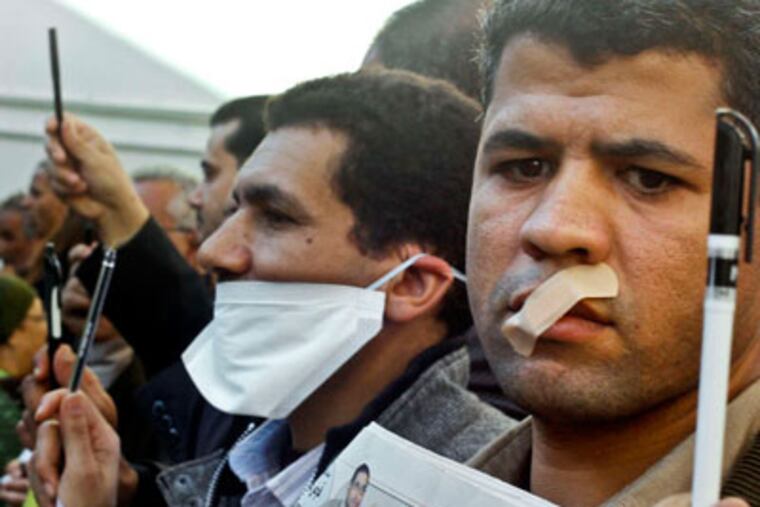Egypt's opposition not giving up
A declared victory for an Islamist constitution has not settled the issue.

CAIRO - Egypt's opposition said Sunday it will keep fighting the Islamist-backed constitution after the Muslim Brotherhood, the main group backing the charter, asserted that it passed with a 64 percent "yes" vote in a referendum.
The opposition alleged vote fraud and demanded an investigation - a sign that the referendum will not end the turmoil that has roiled this country for nearly two years since the uprising that ousted authoritarian leader Hosni Mubarak. Many Egyptians, especially the tens of millions who live in extreme poverty, had hoped the new constitution might usher in a period of more stability.
A heated debate leading up to the referendum at times erupted into deadly street battles. There were no mass opposition demonstrations Sunday after unofficial results came out.
Renewed violence and political tensions have further imperiled Egypt's already-precarious economy, reeling from dwindling resources and a cash-strapped government whose plans to borrow from the International Monetary Fund had to be pushed back because of the turmoil.
The finance ministry said Sunday the budget deficit reached $13 billion in the five months from July to November, about 4.5 percent higher than the same period last year.
Official results of the referendum are not expected until Monday.
If the unofficial numbers are confirmed, it will be a victory for Islamist President Mohammed Morsi, who is from the Brotherhood.
But the opposition allegations appear likely to prolong the fight. Beyond allegations of fraud, the opposition will likely challenge new laws issued on the basis of the constitution as well as Morsi's economic policies.
"The referendum is not the end game. It is only a battle in this long struggle for the future of Egypt," said the National Salvation Front, the main opposition group. "We will not allow a change to the identity of Egypt or the return of the age of tyranny."
The opposition argues that the new constitution seeks to enshrine Islamic rule in Egypt and accuses the Islamists of trying to monopolize power.
Critics say it does not sufficiently protect the rights of women and minority groups and empowers Muslim clerics by giving them a say over legislation.
The latest political battle began with Morsi's Nov. 22 decrees that gave him powers to protect the Islamist-dominated panel writing the constitution and dismiss the country's top prosecutor, a holdover from the Mubarak era.
Although Morsi subsequently rescinded the powers that gave him immunity from judicial oversight, his decision to replace the prosecutor general was viewed by many in the judiciary as trampling over their powers. Hundreds of prosecutors held a rally Sunday demanding the new Morsi-appointed prosecutor general quit, days after he retracted his resignation, contending it was tendered under pressure.
The prosecutors said in a news conference that they will be on strike until he quits.